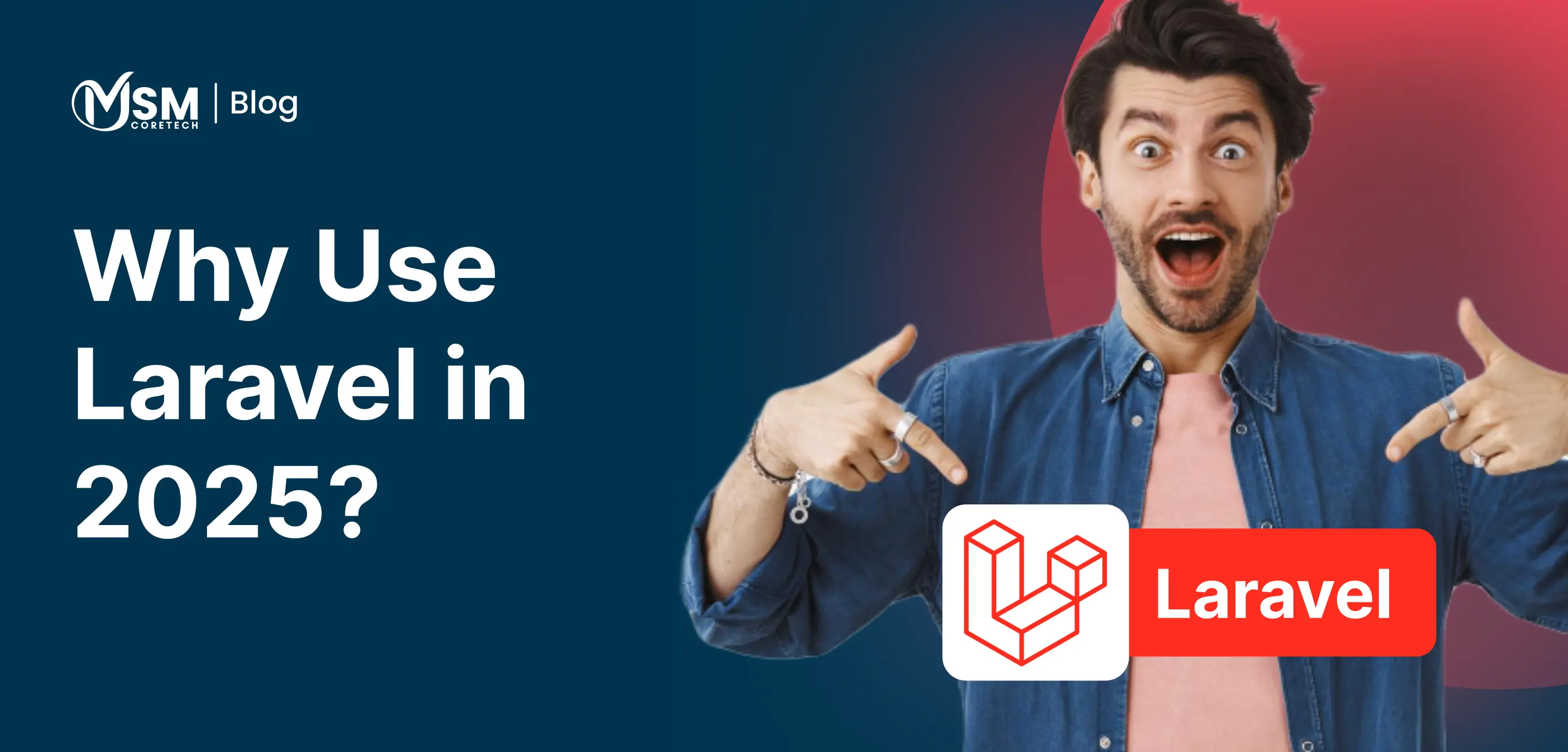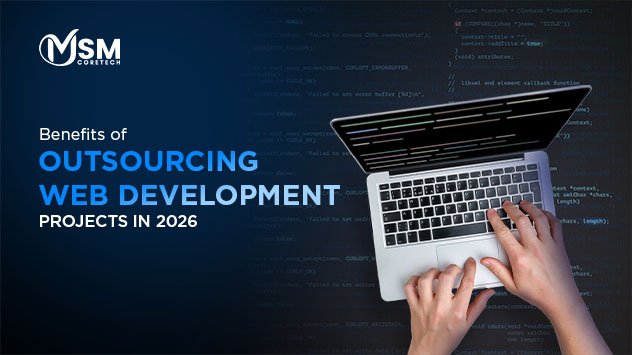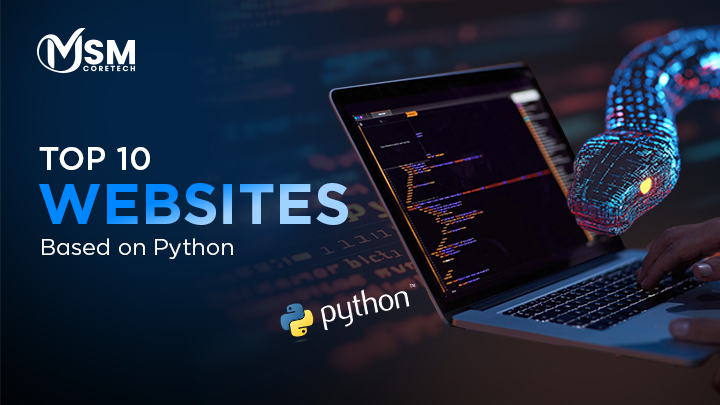Why Use Laravel - Benefits, Features and Future of PHP Framework

Laravel is one of the most sufficient PHP frameworks for building good web applications. Following its creation in 2011, it has constantly transformed, resolving key developer needs and improving the modern web development system.
Laravel is largely adopted across different business sectors, from offering high-traffic sites to complex enterprise developments in industries like healthcare and finance.
Additionally, in the new era of digital web development, Laravel’s necessity is uplifted through regular upgrades, offering an ecosystem for the integration of first-party tools.
These tools also help developers in building innovative applications faster by automating common tasks such as routing and authentication.
This blog aims to explore why, despite too much innovation in the IT sector, Laravel remains a top choice for developers in 2025.
By examining its core functions, future-proof nature, and alignment with modern tools, the blog will determine its value for developing secure, scalable, and maintainable web applications.
The Evolution of Laravel
Laravel has changed the strategies through which developers create web applications, dynamically transforming the PHP development mechanism with advanced features, user- friendly assistance, and elegant design.
History of Laravel -
The beginnings - Laravel was developed in 2011 as a substitute for the Codeigniter framework. Laravel's creator aimed to develop a more detailed and expressive user-friendly application that could reform the web development process in an easier way. Laravel 1.0 consists of features like simple ORM, authentication, and routing, offering such features that can make it a popular and widely used framework.
The Rise - Laravel 4.0 was released in 2013, which led to a prominent shift for the framework. Reformed from the start, it leveraged features like Composer for package management, making it easier for software developers to collaborate with third-party applications easily. This version also deployed a unique feature of queues that helps with the background competition of the task.
The modern era - As Laravel was constantly evolving with time, it fosters new strategies for modern age development. Version 6.0 was developed in 2019, with offerings such as semantic versioning, which helped users in upgrading and managing their progress.
Why Laravel Remains Relevant in 2025
Laravel has transformed in relevance to modern era techniques from its commitment to offer, effective, modern, and enjoyable development process consisting of robust features and a sustainable ecosystem.
In 2025. Developing source, flexible, and fast-performing web applications is crucial to achieving digital growth and success. Among different technologies, Laravel has constantly dominated the web development market as the most significant PHP framework.
Around 2.5 million web applications have been created through Laravel since its creation, and its performance is constantly enhancing with time. The vibrant nature and supportive community of Laravel make it the most appropriate tool for developing well-optimised web applications.
Top Reasons to Utilise Laravel in 2025-
- Progressive Web App - Laravel interacts and indulges smoothly with different service platforms, as it combines the front-end operability with tools such as Inertia.js to provide support to Progressive Web Applications. In addition, in today's mobile-driven era, this feature helps users in generating progressive web applications that can work offline and load quickly.
- High performance - Laravel is developed to manage high traffic and scale the functioning of applications to offer the best experience. Laravel leverages performance applications such as indexing and OPcache in the background to monitor the accuracy rate for better scalability.
- IoT-ready framework - Laravel structure is compatible with real-time IoT tools, as it can easily collaborate with MQTT brokers such as Mosquitto to monitor and manage live real-time information. With the help of broadcasting tools like WebSockets, it is easier for developers to build systems that are high-performing.
- Backward compatibility and Long-term support - Long-term support systems of versions of Laravel, such as 6.0 and 9, offer bug resolution and security updates for the next two to three years significantly. This allows companies to prefer Laravel more because of its trusted features.
- Microservices infrastructure for scalable applications- Laravel has transformed the development process of microservices quicker and easier with its prominent features like queues and Laravel events. Moreover, teams can generate segmented services that can interact seamlessly through message brokers like RabbitMQ.
Business Perspective: Why Companies Choose Laravel in 2025
Laravel is a widely adopted free PHP framework for web application development. It is renowned because of its clean coding features, creating a great mix of complex development projects. In addition, Laravel’s in-house functions help in fastening up the creation process by addressing the developer needs.
In 2025, enterprises are rapidly adopting Laravel because of its significant characteristics such as user-friendly functioning, a long-term support system. The framework’s rich functioning system of pre-developed tools and community support helps in the fast development of high-performing web applications, making it a strategically right choice for business organisations.
Benefits for Different Types of Organisations -
Startups-
Startups working with tight deadlines and having low capital can benefit from Laravel features -
- Rapid MVP development - Laravel helps in increasing the development of MVPs, as it has built-in modules for routing and database management, which reduces the time for writing code from the start.
- Cost effectiveness - Laravel is an open-source framework that has no licensing fees, and this is all combined with its prominent development features which help in reducing the overall project cost more effectively.
Big Organisations-
Laravel’s robust infrastructure makes it a trusted choice for enterprise-level applications:
- Long-term support - The framework leverages long-term support versions, offering a guaranteed bug resolution and security fixes constantly with time.
- High scalability - Utilising advanced methods such as Laravel Octane for serverless deployments and Horizon for managing job applications. Organisations can handle large amounts of data and requests without leaving anything behind.
Developers -
For developers, upskilling in Laravel helps in attracting great career opportunities.
- High demand - As Laravel is widely adopted by both large companies and new-age startups, the constant demand for skilled professionals is increasing for full-time and even for freelance roles.
- Learning community - The supportive Laravel community provides exclusive resources such as Laracasts and tutorials, which offer constant learning and growth.
Comparisons with Other Frameworks
Node.js, Laravel, and Django all help in achieving the same objective, i.e, developing a web application.
- Laravel - Laravel is a free and open-source PHP framework that helps developers to utilise the MVC pattern in alignment with their development needs.
- Django - Django is a Python-based framework that offers developers to leverage a systematic approach for web development.
- NodeJS - NodeJS is a runtime JavaScript-based framework that allows developers to use a cross-platform for web application development.
Comparison on the Basis of Needs -
- Scalability and performance - Node.js is the best framework for performance, Django has its own set of guidelines, and Laravel has a set of methods that can make your web applications stand out in the market.
- Security - Django is the best framework when it comes to security, after which Laravel has its impact. However, Node.js is very popular, but it has significant holes that remain unnoticeable for a long time.
- Customization - Node.js offers maximum features for the best personalization features, as it is backed up by JavaScript; Django has a lot of complications while offering customization features. Laravel needs collaboration with certain third-party applications to offer personalized customization.
- Infrastructure - Laravel leverages the MVC pattern, whereas Django fosters the MVT architecture, and Node.js is just event-driven, having the best architecture.
We have examined all three prominent functioning frameworks; choosing one from these three frameworks should be done based on the requirements of the web development process. One framework might be better than the other, but it totally depends on which one to choose by aligning it with your goals.
Future of Laravel Beyond 2025
Laravel is not just a PHP framework; it has emerged as an ecosystem that drives APIs, SaaS applications, or even AI-powered workflows. With the introduction of Laravel 12, which is becoming very popular just after its launch, 2025 is a more exciting year for developers.
Laravel’s innovative features introduce methods like Gate inspect, which helps in delivering custom messages with the authorization process requests if declined. In addition, the built-in library supports a distinction of important log handlers without wasting anytime using Amazon SES and Mandrill.
Key futuristic considerations -
- Laravel collaboration with artificial intelligence - The integration for AI and machine learning platforms into the Laravel framework is widely used for features like Content automated generation (product descriptions, blog drafts and emails). Laravel offers workflows and packages to leverage these APIs completely in the system.
- Laravel & microservices infrastructure - Laravel helps in decompressing large applications into single-line Laravel services. Deploying Laravel Octane with roadrunner for enhanced performance. This modular architecture helps in creating more maintainable, high-traffic generated scalable designs.
- Laravel integration with real-time applications - Laravel pusher and websockets help developers in the development of applications that are more engaging with fast loading rates. Moreover, in 2025, real-time APIs are necessary to survive in the market, and Laravel broadcasting helps in fulfilling this need with the help of its data tracking and monitoring features.
Laravel Role in IOT, Web3, and AI-Powered Applications
Laravel functionality is based on a secure backend framework connecting with applications for advanced technologies like IOT, Web3, and AI. While this framework does not directly enhance the functioning of these applications, rather than its enhanced API capabilities, the modular architecture helps developers in developing intelligent, real-time data-driven applications.
Laravel’s Role in Web3 -
In support of Web 3, Laravel can offer traditional backend services that manage user interactions, while blockchain manages the basic transactions and logics.
- Digital wallet integration - Laravel can facilitate user connectivity with their crypto wallets and communicate with smart deals to offer a seamless transaction process.
- Data integration - By interacting with blockchain, the Laravel framework can assure immutable and transparent monitoring records for factors like supply chain monitoring services.
Laravel’s Role in IOT -
Laravel offers a scalable and flexible backend for processing, analyzing, and storing the real-time data from IOT devices to enhance the efficacy of the applications.
- Effective data management- Laravel helps in managing data from different devices in single time as its queue system and cloud methods can handle large data processing in the backend.
- Real-time dashboards development - Developers can utilise Laravel to develop engaging web dashboards that can offer real-time information by integrating tools like Laravel Echo.
Laravel’s Role in AI-based Applications -
Laravel is being rapidly used to develop intelligent, data-based applications by collaborating with machine learning and powerful AI services.
- Enhanced user experience - Laravel is combined with AI to offer customisable user experiences, offer useful strategies, and automate repetitive business functions.
- In-house model collaboration - Laravel can interact with machine learning and AI models with the help of the integration of the REST API.
Conclusion
Laravel acts as a web development powerhouse because of the combination of technical strengths and emerging business benefits it offers. The PHP framework offers a constant, enjoyable developer experience, which helps teams in developing high-performing applications easily.
An advanced, constantly changing environment of a variety of tools, like Laravel Vapor for serverless development for optimized speed and functioning, helps in ensuring Laravel stays advanced in this modern era.
From a business point of view, Laravel offers a good return on investment with enhanced development cycles and helps in decreasing the overall operational cost of the project.
Laravel stability, vast community translation, and support help in easy maintenance and predict hiring costs. The structure makes it a perfect fit for agile startups in developing their first MVP in comparison with complex SaaS platforms and e-commerce web solutions.
It seems very relevant to relate the use of Laravel as the top web development framework. It improves the process of developing compelling websites with optimised and enhanced experience.
Related Blogs

Website Development Cost in USA
Explore website development cost in USA for 2026. Learn pricing by website type, features, phases, and factors that impact total cost.
Read More

Benefits of Outsourcing Web Development Projects in 2026
Explore the benefits of outsourcing web development projects in 2026. Learn costs, models, and how to choose the right web development outsourcing company.
Read More

Top 10 Websites Based on Python
Explore top websites based on Python, like Netflix, Uber & Reddit and learn why a website development company uses Python for scalable, secure web apps.
Read More



